The world in memorializing Nelson Mandela today in Johannesburg. As a personal tribute, I am posting the condensed text of a sermon I preached back in April that uses his life as an illustration of just how much one person, guided by love, can accomplish. In the words of South Africa’s current President, Jacob Zuma, “We always loved Madiba for teaching us that it was possible to overcome hatred and anger in order to build a new nation and a new society” (New York Daily News, 12-07-13). May we emulate Mandela as well as remember him. -BTT
Some months ago, I saw a banner ad on the side of a bus in DC. The banner featured a picture of Nelson Mandela along with the caption, “Never underestimate the power of one person to change the world.” I had almost forgotten about it, until my studies this week sent it rolling back through my mind.

First, I was reminded that 19 years ago today (April 28, 1994) South Africans were voting in the first free elections that country had ever seen – the first elections in which all adults of eligible age could vote regardless of their ethnicity. It was that election that would make Nelson Mandela President of South Africa.
Since that time, of course, Mandela has gone on to become a world icon. He is celebrated wherever he goes and his 90th birthday in 2008 became an international affair. And deservedly so, because Nelson Mandela did, in fact, change the world. Not only was he instrumental in dismantling apartheid, but he also (more than any other individual save Desmond Tutu) prevented South Africa from trading one form of oppression for another. Post-apartheid South Africa could so easily have devolved into a state of retribution. But it didn’t – because Mandela, Tutu, and a handful of others resolved that it wouldn’t.
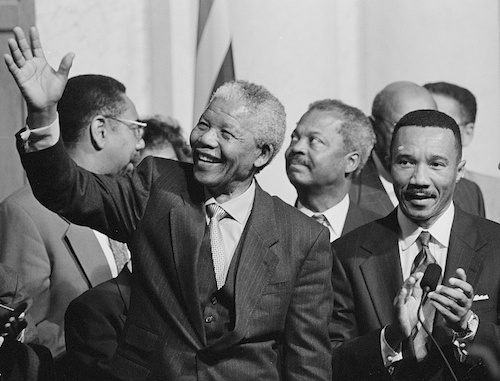
The other reason why this rolling public service announcement (or whatever it was) featuring Nelson Mandela has come back to my mind is that I’ve been reading John 13.31-35. I’ve been ruminating on the new commandment Jesus gives to His disciples: love one another just as I have loved you – something much easier said than done. It’s really the “just as I have loved you” bit that’s the kicker.
If Jesus hadn’t said that, if He hadn’t slipped that qualification in, we could read this passage in the sentimental light that we tend to – and prefer to. We could leave things with each other comfortably on the surface: a hug here, a handshake there, the passing of the peace, the polite exchange of pleasantries, the occasional extension of a helping hand.
But Jesus did say it. He did slip it in.
Now, this qualifier doesn’t mean that our comfortable, surface-level expressions of affection are wrong. They aren’t. They are needed and necessary. But “just as I have loved you” means those things aren’t enough. They aren’t nearly enough – not in the Kingdom of God, not in the Body of Christ. Why? Because love is the end all and be all of the life Christ calls us to as His people.
The Apostle Paul put it this way in 1 Corinthians 13.1-3: If I speak in the tongues of mortals and of angels, but do not have love, I am a noisy gong or a clanging cymbal. And if I have prophetic powers, and understand all mysteries and all knowledge, and if I have all faith, so as to remove mountains, but do not have love, I am nothing. If I give away all my possessions, and if I hand over my body so that I may boast, but do not have love, I gain nothing.
Love that foundational is, by necessity, a deeper, riskier kind of love than the love we tend to experience elsewhere on this earth. It’s what makes the Kingdom of God different: a new reality, a new paradigm; a cut above and step beyond the ways of this world. It is a counterpoint, in fact, to the ways of this world. It’s a love that ultimately does not and cannot come from us. It can come through us; but its source is beyond us.
“Love that foundational is, by necessity, a deeper, riskier kind of love than the love we tend to experience elsewhere on this earth. It’s what makes the Kingdom of God different”
That’s why, as followers of Christ, we must strive to love one another just as He (first) loved us. It’s how we bear witness to the reality of the Kingdom.
Otherwise, what’s the difference? Indeed, what’s the point? As Jesus said elsewhere (Luke 6): “If you love those who love you, what credit is that to you? For even sinners love those who love them. If you do good to those who do good to you, what credit is that to you? For even sinners do the same. If you lend to those from whom you hope to receive, what credit is that to you? Even sinners lend to sinners…”
This is why Jesus gave us these instructions, set forth these commandments, and issues to us a call: love God with all of your heart, mind, soul, and strength; love your neighbors as you love yourself; love even our enemies.
It’s not just a call to love as Christ loves; it’s really nothing less than a call to change the world.
And so what better place to look in trying to understand that kind of calling than to the life of a living, breathing person who has, in fact, helped to change the world through love? A man who, in his autobiography, credits his Christian faith as the source from which his actions and convictions derive. A man who, for all intents and purposes, should be the last person to embody the life-giving, life-changing power of Christ-like love. A man named Nelson Mandela.
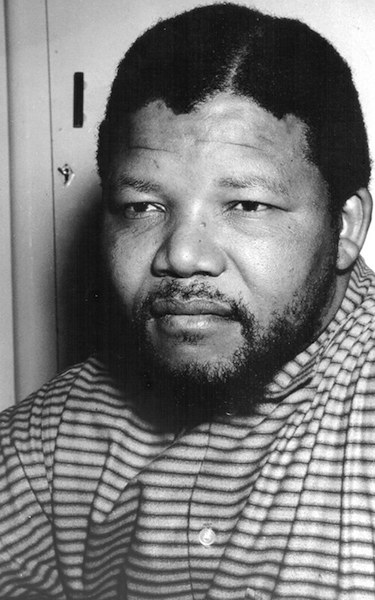
Mandala’s story is all the more inspiring because the actions and convictions for which we know him weren’t always his actions and convictions. He had to be changed. He had to be transformed. And so must we. We must – if we dare to call ourselves Christians, if we profess Christ as our Lord. We must – because Jesus has made the consequences of His commandment clear: by this everyone will know you are my disciples, if you have love for one another.
We must – and we can. If Nelson Mandela can be transformed, we can.
Nelson Mandela began his political career as a militant. He founded the paramilitary wing of the African National Congress. Basically, he was a terrorist. He believed that a violent, oppressive regime had to be opposed with force. Non-violent resistance wasn’t enough – it wasn’t going to work. That is why he was put in prison.
So how did a militant leader go from convicted terrorist to celebrated human rights activist? Knowing what I know of his story, I think he possessed three key qualities that enabled him to make the journey he did – and that we can draw strength and inspiration from in our own journeys.
1. He was willing to learn – which means he was open to change.
Transformation is a process that needs an incubator, and Nelson Mandela had one. For him, it was Robben Island, South Africa’s most notorious prison. Desmond Tutu has written that when Mandela was first imprisoned, he was “forthright and belligerent” but in jail he “mellowed.” He “began to discover depths of resilience and spiritual attributes that he would not have known he had.” He allowed the suffering to ennoble him, and found himself “able to be gentle and compassionate towards others.”
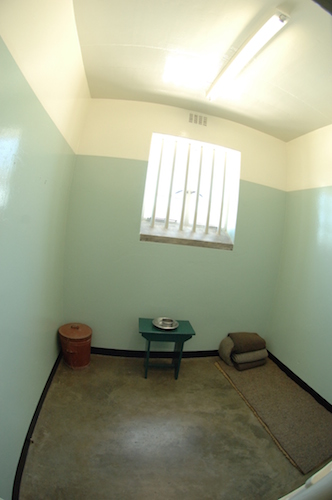
He found a strong sense of solidarity with his fellow prisoners through their shared experience of suffering. The prison was bitterly cold and none of them received adequate clothing. The food served was barely edible. Their days were spent in exhausting physical labor at the prison’s limestone quarry, breaking up rocks for use in roadbeds. Their guards were racist and regularly demeaned the inmates. In fact, racism appears to have been a prerequisite for employment on Robben Island.
In this environment, Mandela came to realize that if he and his fellow prisoners stooped to the level of the guards, to the level of the system – if they insisted on fighting fire with fire – nothing would be gained and what would be lost in the struggle would be their own dignity. He came to see and understand that the system of apartheid dehumanized the oppressors as well as the oppressed. And that realization utterly changed his approach to life – and to resistance.
2. He lived what he learned
Nelson Mandela didn’t stop simply with studying. He didn’t just make observations and jot down notes. He put what he learned into practice.
When he was finally released from prison after 27 years, one of the first and truly remarkable things he did was to approach his enemies with kindness. He paid a special visit to the chief prosecutor, the man who had robbed him of 27 years of his life, just to shake his hand. Rather than depose the leaders of apartheid (which he easily could have done with a groundswell of public and international support), he set out to build relationships with them. He reached out to them with love and grace. In doing so, he utterly confounded and disarmed them.
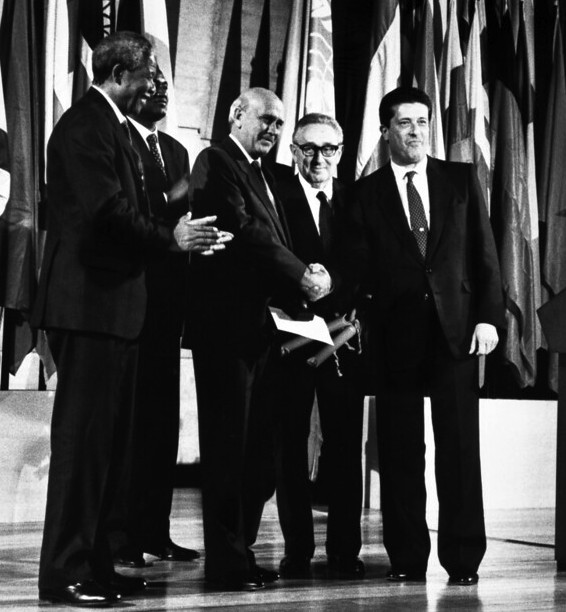
And he continued in this posture even after he won the election, even after he had all the political and legal authority he needed to act without them. One of the most powerful stories I’ve heard about his relationship with his former enemies is that he once interrupted official state business to go and visit with one an apartheid boss whose wife was dying of cancer. Mandela learned of the diagnosis as he was on his way to meet another head of state, and he took a two-hour detour to be with them in their time of grief.
The result of Mandela’s new approach to life and politics was that people who had literally been trying to kill each other started working together to build a new South Africa. This is the power of living what the gospel teaches us:
If someone strikes you on one cheek, offer the other one as well. If someone asks you to go one mile, offer to go a second mile. If you have two coats, share one with someone who has none.
If your enemies are hungry, feed them; if they are thirsty, give them something to drink; for by doing this you will heap burning coals on their heads.” Do not be overcome by evil, but overcome evil with good.
“All the things that serve to weigh us down and keep us apart – hate, distrust, indifference, suspicion – cannot persist in the wake of life lived in such a gospel fashion. They are swept aside by the rising tide of all the things that build us up and bring us together “
All the things that serve to weigh us down and keep us apart – hate, distrust, indifference, suspicion – cannot persist in the wake of life lived in such a gospel fashion. They are swept aside by the rising tide of all the things that build us up and bring us together – brotherhood, sisterhood, respect, affection: a tide that naturally swells and washes over everything around it when a love like Christ’s love passes through.
Christ calls us to this life of faith, love, and service not just because it’s noble, but also because it works.
3. He believed in who he is.
Generations of Nelson Mandela’s family served as royal advisors to the kings of what we know as South Africa, long before European colonists arrived. Thus, he had a lineage to remind him that he was somebody even though he lived under a system bent on convincing him that he was nobody.

Thankfully, we don’t live in an apartheid state (anymore), but we do live in a materialistic one that makes judgments about people based on what they do or don’t have. Advertising can beat people down just as forcefully as a police battalion. The message we receive day in and day out is that we are what we possess. In such a culture, our lack of wealth and success can make us feel worthless AND our achievement of wealth and success can give us a false sense of importance.
But Scripture teaches us that, if we are followers of Christ, no matter what our earthly circumstances may be we have a royal pedigree. We have value not because of anything we do – but because of what God has done in creating us in God’s image and redeeming us through the death and Resurrection of Christ Jesus. Through Christ, we have peace with God and we are heirs to the Kingdom of Heaven (Romans 5.1). And so, in our struggles the gospel helps keep us afloat; and in our successes, the gospel helps keep us grounded.
This orientation is important because this orientation is the foundation of our discipleship. You and I can answer the call Jesus extends to us – to love just as He loves us – because we are worthy of that calling. We are heirs to His Kingdom.
Yet, too often we count ourselves out because we fail to trust in our gospel identity and believe falsely that we have nothing to offer. Or we count ourselves too far in because we fail to trust in our gospel identity, and we believe falsely that we’re the only ones who can do things right. Either way, we wind up turning our backs on others. That’s not what God wants from us, and not what the world needs.
“Yet, too often we count ourselves out because we fail to trust in our gospel identity and believe falsely that we have nothing to offer. Or we count ourselves too far in because we fail to trust in our gospel identity, and we believe falsely that we’re the only ones who can do things right. Either way, we wind up turning our backs on others.”
“
The gospel helps give us balance – the same kind of balance Nelson Mandela has found, that has allowed him to be fully who he is and allowed him to embrace others more fully as they are. Perhaps more than anything, that has been the key to his success, and the nations of the earth are in desperate need of more successful people like that.
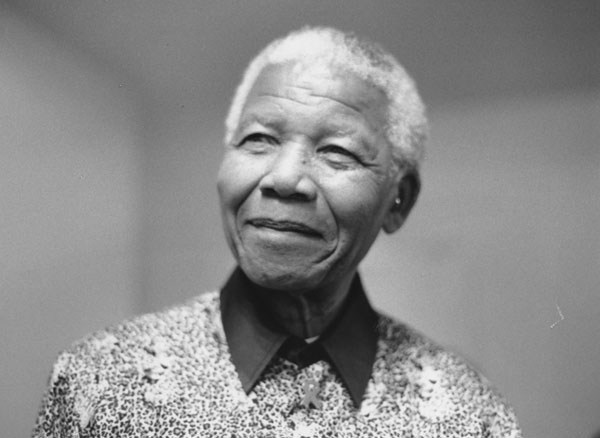
There is a lot wrong in our world. There is a lot wrong in our nation, our state, our city, and in our own lives. But the world can be a better place. God is very much at work building God’s Kingdom, at work transforming the world – and He calls us to be a part of that work as members of the Body of Christ, as instruments of His love, grace, and mercy.
Let us never underestimate the power of one person to change the world. You’ve heard Nelson Mandela’s answer to the call. What will your answer be?

























